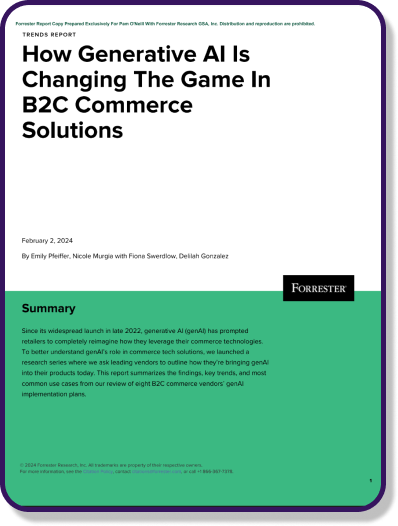In the age of digital retail, consumers demand detailed, accurate, and personalized product content across every platform, yet creating this information at scale can be a daunting challenge for brands. Discover how GenAI is resolving this paradox by automating key tasks such as generating product descriptions, optimizing SEO, and translating data for global markets.

Keywords
Retailers and brands are caught in a paradox when it comes to creating product information: consumers demand increasingly detailed, accurate, and personalized product content across every touchpoint, but producing this information at scale is time-consuming and labor-intensive.
Product detail pages (PDPs) must be rich with descriptions, features, and reviews to drive engagement, yet retailers often struggle to keep up with these demands while maintaining quality and speed.
Enter generative AI (GenAI)—a solution that almost two-thirds B2C commerce vendors have already begun using to generate high-quality, SEO-optimized product content at scale.
By automating manual and lengthy processes, GenAI allows retailers to generate content faster, reduce time to market, and ensure product information is accurate across multiple channels.
Sound too good to be true? Let’s take a look at six real-life use cases for utilizing GenAI to create product information at scale.
Creating product names and descriptions that are both SEO-friendly and compelling to consumers is a core part of any product’s digital identity. Traditionally, this process required skilled copywriters to craft unique descriptions for thousands of items—a process that could take weeks or even months for large catalogs.
GenAI is enabling retailers to accelerate this process. For instance, Colgate-Palmolive is piloting a GenAI tool to optimize its product detail pages to ensure they resonate with target audiences. Similarly, beauty giant Ulta is using GenAI to streamline the creation of product descriptions, making them more engaging while saving time and resources.
Beyond these examples, many other brands are exploring how GenAI can handle this task. By analyzing product specifications, target audience preferences, and industry trends, GenAI can create tailored descriptions that boost engagement and conversion rates. Retailers can even use GenAI to A/B test multiple descriptions, identifying which ones drive the most sales.
Additional use cases might include:
Customer reviews are a goldmine of information for both consumers and retailers. For shoppers, reviews provide an unbiased, trustworthy insight into how the product has performed for them and can create a real feeling of authenticity, which is crucial in today’s day and age. Sixty-eight percent of US online adults say it’s important for retailers to include ratings and reviews on their site.
For brands and retailers, not only do customer reviews provide insights into product performance, but they also boost SEO by including real, user-generated content with keywords that are popular with their actual audience.
However, sometimes the sheer volume of reviews can be overwhelming. Long review sections may cause decision paralysis, making it difficult for potential buyers to extract relevant information, and could take weeks or even months for an employee to comb through and extract key insights.
This is where GenAI comes in handy. In particular, retailers can apply GenAI to:
Getting product pages to rank well in search engine results is crucial for driving organic traffic. However, tweaking content to match the latest SEO guidelines can be labor-intensive, especially as search algorithms become more sophisticated.
GenAI can help by automatically optimizing content to improve search engine performance. This includes suggesting high-ranking keywords, refining product descriptions to align with current search trends, and ensuring product metadata is structured correctly.
Automating processes through GenAI can also significantly enhance search engine optimization, such as auto-generating meta descriptions, alt-text for images, product FAQs that answer common customer queries, and product titles that are optimized for specific search queries and creating long-tail keywords for niche product categories, which would help retailers capture more targeted search traffic. As Google continually updates its algorithm to favor more natural, conversational content, GenAI’s ability here to produce human-like text becomes more and more invaluable.
GenAI is proving invaluable for retailers who need to scale their marketing efforts across multiple channels. From email campaigns to social media posts and video scripts, GenAI can generate marketing content that aligns with a brand’s voice and objectives. According to Forrester’s Consumer Digital Experiences Survey, 61% of digital experience professionals who indicated their retail organization is using generative AI with customers use it to generate images for use in consumer communication.
Retailers like Carrefour and Stitch Fix are already leveraging GenAI to create marketing assets at scale. Carrefour used ChatGPT and AI-generated avatars for its video marketing, while Stitch Fix employed GPT-3 to generate ad copy for its fashion products, saving time for its creative teams.
Retailers can harness the power of GenAI to create blog posts or articles that showcase key product features, or generate email newsletters with content that is automatically tailored to different customer segments for a more personalized approach. Beyond this, GenAI enables the creation of individualized content, such as customized product recommendations or reminders, enhancing the overall shopping experience.
In the realm of video marketing, GenAI can produce scripts optimized for platforms like YouTube or TikTok, ensuring the messaging resonates with specific audiences. It also simplifies social media management by crafting content that maintains brand consistency while adapting to the unique needs of each platform. Plus, the speed at which retailers can generate this content with AI means that they’re able to respond quickly to real-time trends and stay relevant in the fast-moving digital landscape.
GenAI can also be a tool for customer engagement. By creating interactive, customer-facing features, brands can deepen customer relationships and drive loyalty. A great example is 1-800-Flowers.com, which used ChatGPT to create personalized poems and songs for Mother’s Day.
Thinking outside of the box on how to utilize GenAI for exciting customer engagement campaigns is a great way to not only capture media attention but also engage customers who may not have interacted directly with your brand otherwise. Some other ideas here could include:
In a global marketplace, translating product information quickly and accurately is vital for reaching international customers. Traditionally, this has been a manual process, prone to inconsistencies and errors.
GenAI can automate and standardize the translation process, making it easier for retailers to localize content for different regions. Commerce search vendors are also integrating this functionality to help global brands offer a consistent shopping experience.
There’s a massive range of potential uses of GenAI in translation, including localizing product descriptions to suit different markets while taking into account cultural context. It can also translate customer reviews, ensuring that feedback is accessible to customers worldwide, and can enable the creation of region-specific marketing materials that align content with local preferences and customs.
Retailers can generate multilingual FAQs to address the needs of diverse audiences, and use real-time translations during live customer service interactions to ensure smooth communication. Finally, GenAI can automatically translate labels and product specifications, ensuring compliance with regulations in different countries, helping brands maintain consistency and accuracy on a global scale.
The paradox of modern retail is clear: while consumers expect highly detailed, personalized, and accurate product information across every touchpoint, creating this content at scale has traditionally been a labor-intensive process.
However, as we've explored, GenAI is helping to resolve this challenge by enabling brands to automate and streamline the creation of product data, from generating names and descriptions to summarizing reviews, optimizing search engine performance, and even translating product information for global markets.
With nearly two-thirds of B2C commerce vendors already leveraging GenAI, the potential for scaling product information efficiently while maintaining quality is becoming more achievable than ever. Whether through automating marketing content, enhancing SEO, or engaging customers with interactive experiences, GenAI is proving to be a vital tool for the future of retail.
For even deeper insights into how GenAI is shaping the B2C landscape and transforming product information at scale, you can download “The State of Generative AI in B2C Commerce Solutions” for a comprehensive look at the latest trends, real-world applications, and strategies to help your business stay ahead and take advantage of GenAI.
Featuring real-world applications and practical advice for integrating genAI into your business strategy, this report dives into how this tech is impacting the B2C commerce industry.


The 2024 holiday shopping season broke records, with nearly $242 billion in spending and big shifts in how customers shop. Whether you’re looking...
Read more
Discover how Akeneo empowers brands to build flexible, scalable ecosystems that enhance product data management, streamline operations, and deliver...
Read more
Learn how Master Data Management (MDM) helps to provide a strong foundation for enterprises, driving growth and scalability by centralizing master...
Read more